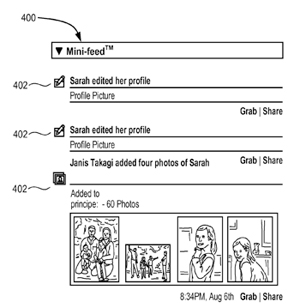Facebook patents News Feed; sets stage for fight against social peers

Facebook on Tuesday was awarded a patent for a social network news feed, setting the stage for a future battle with its social networking peers over similar technologies.
The patent is specifically for "dynamically providing a news feed about a user of a social network" and effectively grants Facebook the opportunity to pursue other social networks who it deems are infringing on the company's patent, reports AllFacebook.
From the abstract:
A method for displaying a news feed in a social network environment is described. The method includes generating news items regarding activities associated with a user of a social network environment and attaching an informational link associated with at least one of the activities, to at least one of the news items, as well as limiting access to the news items to a predetermined set of viewers and assigning an order to the news items. The method further may further include displaying the news items in the assigned order to at least one viewing user of the predetermined set of viewers and dynamically limiting the number of news items displayed.
Status updates do not appear to be included in the patent, but instead the actions of a user's friends on the site. The patent also claims ownership over feed filters, feed advertising and feed searches.
Here's another look:
The patent obviously has implications (which now are unclear in scope) for Facebook's social network peers. Interestingly, the patent was submitted almost four years ago, in 2006, before sites such as Twitter had even launched. That's important if Facebook wants to begin enforcing its intellectual property.
Named in the patent are some of Facebook's top executives: founder Mark Zuckerberg, Ruchi Sanghvi, Andrew Bosworth, Chris Cox, Aaron Sittig, Chris Hughes, Katie Geminder and Dan Corson.
